Hours and hours of work, shifts of several days, a lot of “life” lost or put on pause, but also “that feeling of accomplishment and pride for everything that has been done”. The marks of accumulated fatigue can still be seen on Inês Simões' face, but after a year of fighting this disease, the message of the young doctor who was at the forefront of the fight against Covid-19 is clear: «We are about to continue. It's not time to let your guard down».
Also the voice of Rita Leonardo, a nurse who works in the Intensive Care Unit of the Hospital de Faro, denotes tiredness. And the tiredness is not just – not even above all – physical. It is a psychological burden, of those who dealt closely with the death and suffering caused by this disease. But that doesn't mean there are towels lying on the floor.
A year ago, on March 8, 2020, in the middle of the afternoon, it was known the first case of Covid-19 in the Algarve, that of a 16-year-old girl from Portimão.
Since then, the lives of all health professionals, especially those who worked in the Covid areas of the two units of the Centro Hospitalar Universitário do Algarve, have changed drastically.
«It was a difficult year, very complicated, but, if we look back, it passed in an instant. Because it was all very intense. But it was also a year of great learning. At the beginning, everything was new and we had to learn from the countries that ended up being further ahead, with their mistakes, learning from everything», he told the Sul Informação Inês Simões, physician who coordinated the Campaign hospital at Portimão Arena.
“It was also a period when we had to unite a lot and sometimes, in everyday life, people forget to work as a team. And, in this situation, if it weren't for the people coming together and working as a team, a real team, this could have gone very wrong. I think these are things that we now have to take advantage of and take from now on», he added.
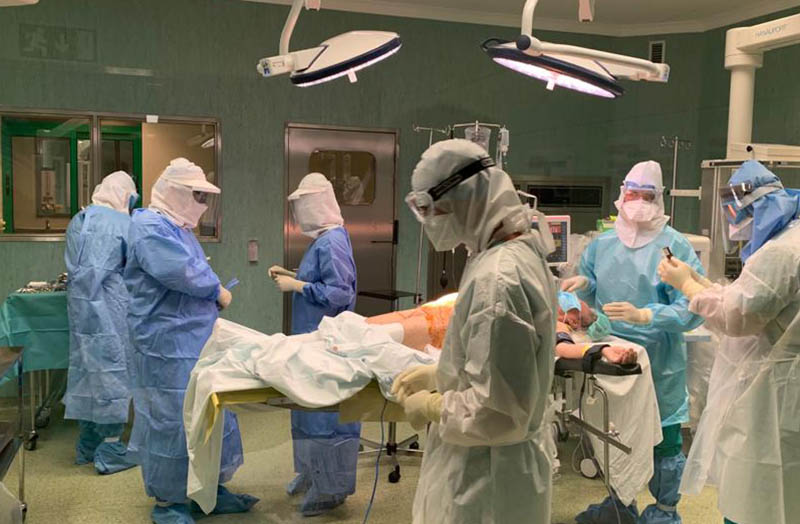
Nurse Rita Leonardo had an especially tough year, in what can be considered the advanced line of combat against Covid-19, the unit destined to patients in a most worrying state.
«This last wave brought a much higher physical fatigue. We were put much more to the test. And the psychological fatigue is also great. Because if, on the one hand, it was already a drag for a long time in these conditions, on the other there were many more people we saw arriving and we were with them every day, seeing them getting worse and worse, giving them everything we can and we can't rescue or save them," he told the Sul Informação.
In addition to all this, “the burden of not being able to enter family members, which is very painful for us. Because we feel that they need to see their family, we see people saying goodbye to life without being able to have their relatives by their side».
“We tried to substitute as we could, of course, so people don't die unaccompanied, give them the best possible moments, but it's not the same thing. There are several weights that, at an emotional level, were and are difficult to manage», he said.
There is also the part of the physical fatigue, which was to start “working 12 or more hours a day, many days a week and with enormous demands”.
«These are very strenuous days. It's difficult to convey the hardness of working fully equipped. Because when we enter the ICU Covid, our patients are always accompanied by nurses and other health professionals. And that means that professionals must be fully equipped, with a suit, gloves, mask and visor and cannot go away even for a little while to drink water or go to the bathroom», he described.
“The facts are obviously uncomfortable. All equipment leaves marks that are visible. Physically, it is also an added difficulty».
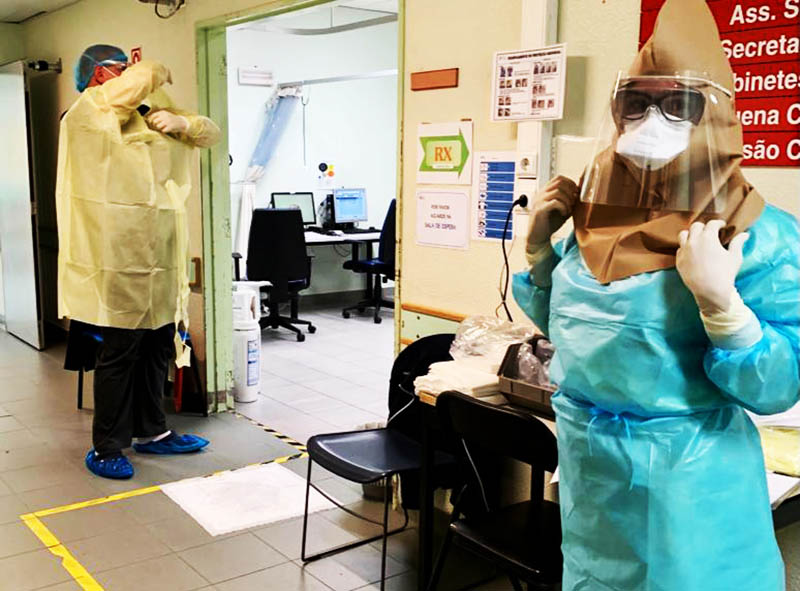
At the Covid-19 infirmary, the hours were even longer, at least for Inês Simões.
«My case is particular, because I went to the campaign hospital in Portimão Arena and, at the beginning, we had few people. I got to do 54 hours in a row. It was my best. Moreover, people were doing around 24 hours in a row, an average of 80 to 96 hours a week», revealed the doctor.
“In personal and family terms, we all had to give up something. It seems that our life had to stop, somehow, and we are all dying to pick up where we left off», explained Inês Simões.
«Initially, it was immediately that insecurity of not knowing very well the virus or what Covid was. We had that anguish of going to work and then returning to our families. There were colleagues who moved away from their families, some sent their children away to feel safe», recalled, for her part, Rita Leonardo.
«Although this last wave was much more painful, for us, with a much higher occupancy and mortality rate, this part of insecurity and returning home was already a little more remedied and allowed us, somehow, to be with the families and no longer have that weight», added the CHUA nurse.
A weight that Rita has not shaken off is the moments she spent treating Covid's patients who needed intensive care.
“We receive patients who are still perfectly aware and oriented and we try to ensure that they are not intubated. We are aware that those who are connected to the ventilator and intubated are very difficult to recover, the mortality rate is high», he described.
“A moment that cost me a lot was when we were preparing a man to intubate him – and, at this stage, patients are already aware of the seriousness that is when this happens. I was at the head of the table holding his hand, talking to him and explaining what was going to happen and it was the expression in his eyes that marked me. I came home with her and walked with her for a few weeks because I got the feeling he sensed the gravity. But the words he said to me - "we'll make it, won't we, madam nurse?" – and us thinking about how hard it was going to be. And his facial expression was something that followed me», he said.
"We are all tired of this situation, very tired", said Rita Leonardo.
The year experienced by these two health professionals and many others like them was, as it turns out, extremely difficult. But «no one regrets».
“It was worth the effort. For every life that is saved and for every person we recover, it's worth it. Even the ones we don't recover, we do many things for them that are worthwhile. Taking care of a sick person, even when he does not survive, there are many things in which we help them. And if we can help, reward. We try, every day, to leave there thinking that we did everything we could for that person and that we helped as much as possible», believes Rita Leonardo.
«I think we all have that feeling of accomplishment and pride for everything that has been done», concluded Inês Simões.
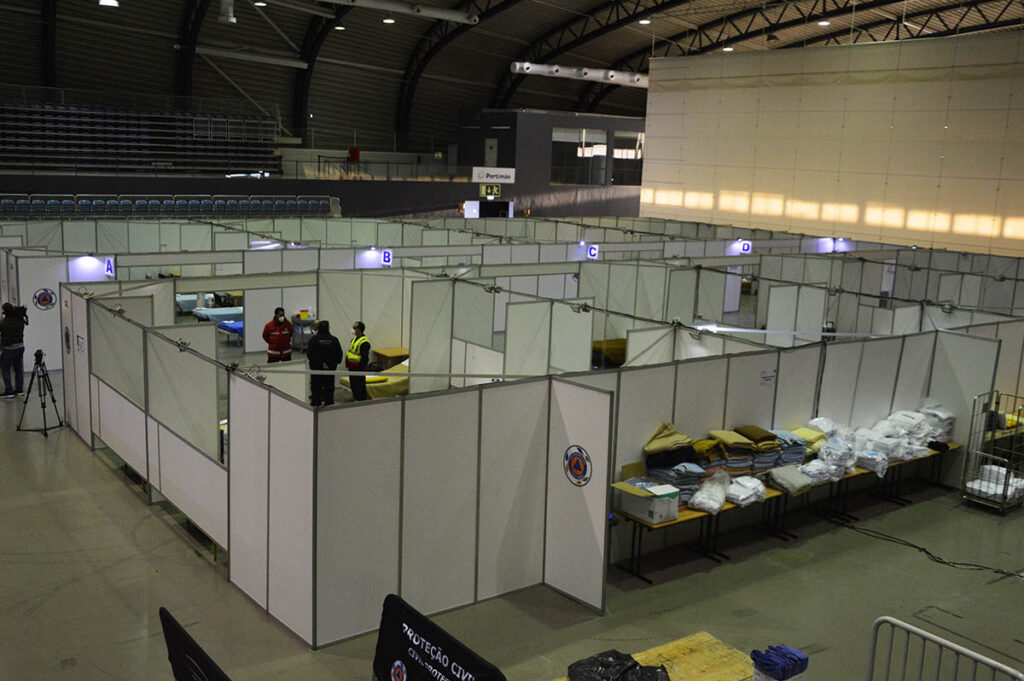
Also proud of the work of CHUA professionals, says Ana Castro, president of the Board of Directors of the Algarve hospitals.
“If it weren't for these people, things wouldn't have gone the same way. This team is really fantastic», he said.
And things went well, in Ana Castro's view, despite the difficult times.
“It was a tough year and full of challenges. We had to be prepared for what we didn't know. In other words, we always had to prepare for the worst, hoping for the best», he told the Sul Informação the president of CHUA.
For this responsible, «the most important moment was the decision of the opening of the campaign hospital in Portimão Arena. It was that milestone in which we thought this could really get complicated».
“But despite everything – and despite the uncertainties of those who went there, because we were working in a completely different place, in a sports hall – motivating a team, making it a cohesive team, making people trust that we were going to give our best, that whoever passed by would have the best possible care and that we would be able to make a difference in the lives of these patients, I think it was achieved», he said.
“But when we received the first patients at the Arena, it was the most stressful moment. It was remarkable, due to the uncertainty», he added.
Ana Castro also pointed out that the Algarve tried to stay ahead of the events and that it was «successful».
“We tried to anticipate scenarios, situations, and this allowed us to respond at a national level: not only ours, but others who needed us”, he believes.
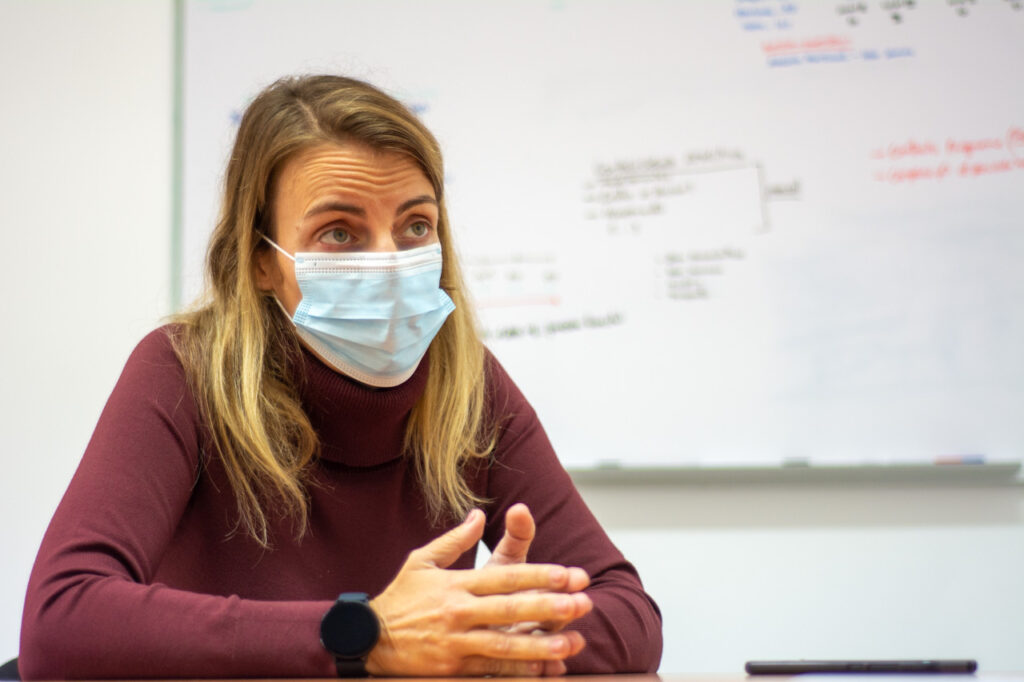
This opening to accept patients from other regions was a reality at the Covid inpatient campaign hospital in Portimão Arena and continues to be so in this new phase, in which CHUA activated a valence for those who have had sequelae of the disease at the Center for Physical Medicine and Rehabilitation of the South, in São Brás de Alportel.
It was, moreover, in this health unit that the Sul Informação spoke with two people who were admitted to intensive care at CHUA due to Covid-19.
Despite already walking and standing for long periods, Luís Palaré had a period, shortly after he beat the disease, in which he depended on others to perform basic daily tasks.
«When I came here, when I went to the bathroom, I was accompanied, to take a bath too. Only at the end of a week was I able to have a minimum of autonomy, for example, taking a shower. But even so, I was sitting down, because I didn't have the strength or balance to do it standing up», he revealed to our newspaper.
It all started with "a small symptom of coughing, of irritation in the throat".
“I went for the test at a private clinic on January 4th and it was positive. Four days earlier he had another test, which came back negative. In the first week of January, I was at home, as advised, taking paracetamol, moisturizing and controlling fever. After five days I had diarrhea, which made me go to the hospital. I thought I was just going there to treat this symptom, but no. The doctors thought that I should stay in the infirmary», he described.
After a few more days, Luís was sent to intensive care, where he spent «about 15 days». In the end, he overcame the disease, but lost “nine kilos” in the process and suffered physical and psychological sequelae.
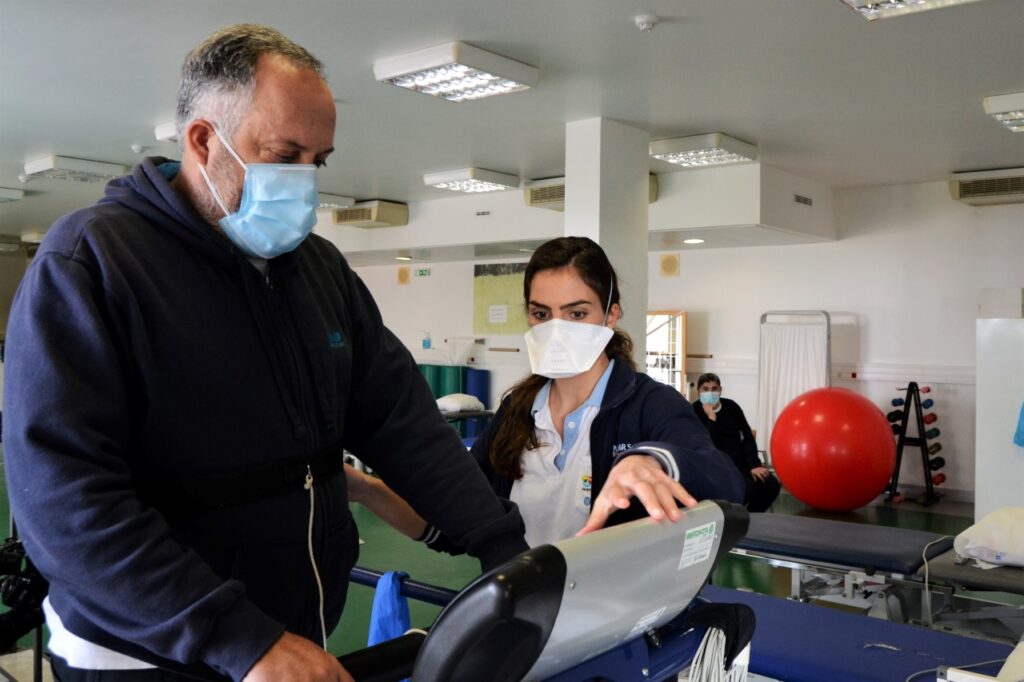
Almost a month after being discharged, this citizen of Faro still feels “very tired. A minimum of effort requires a great cardio-respiratory capacity that, at this moment, I still don't have».
«Still today I am suffering from the disease. I don't have the mobility, breathing capacity, or balance I had before. And, in psychological terms, it also affects, as we have difficulties in dealing with certain situations that were easy for us before», said Luís Palaré.
At a less advanced stage of the recovery process is Ana Paula Cortes.
“I got sick in the middle of January. It was past Christmas and New Year and I was fine. I just remember being at home and having a lot of diarrhea and not having strength in my legs. I live with my brother-in-law and my daughter and he took me to the hospital in Faro. I don't know how long I stayed there, I can't remember», he told our newspaper.
“I know I was in intensive care, because they told me. But I don't know if I had the tube. They told me I was very bad, that much I know. But, thank God, I got better», added Ana Paula Cortes.
Although they are still suffering the consequences of the disease, this is already a path for the future, both for Luís and Ana Paula. After all, the disease has been overcome and help to return to a normal life is being provided.
“Right now, we have some hope that what was needed in this first year will not be needed again. But the reality is that, with the experience we already have, we will hardly have any surprises», believes Ana Castro.
«We are going to keep the same preparation, the anticipation, at the same time as we resume what we had thought for the Hospital Centre. We will go back to normal work, because we have to improve health in the region and that is our commitment: to recover everything that was stopped a little by this pandemic”, concluded the Chairperson of the Board of Directors of CHUA.
Help us to do the Sul Informação!
Contribute your donation so that we can continue to make your journal!
Click here to support us (Paypal)
Or use our IBAN PT50 0018 0003 38929600020 44
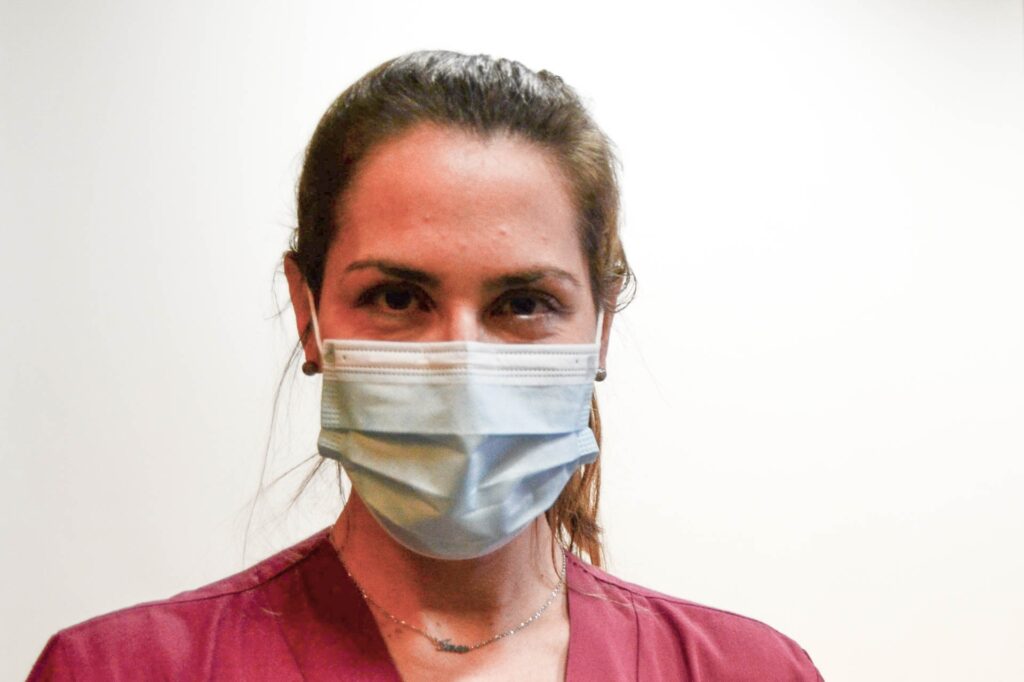


















Comments